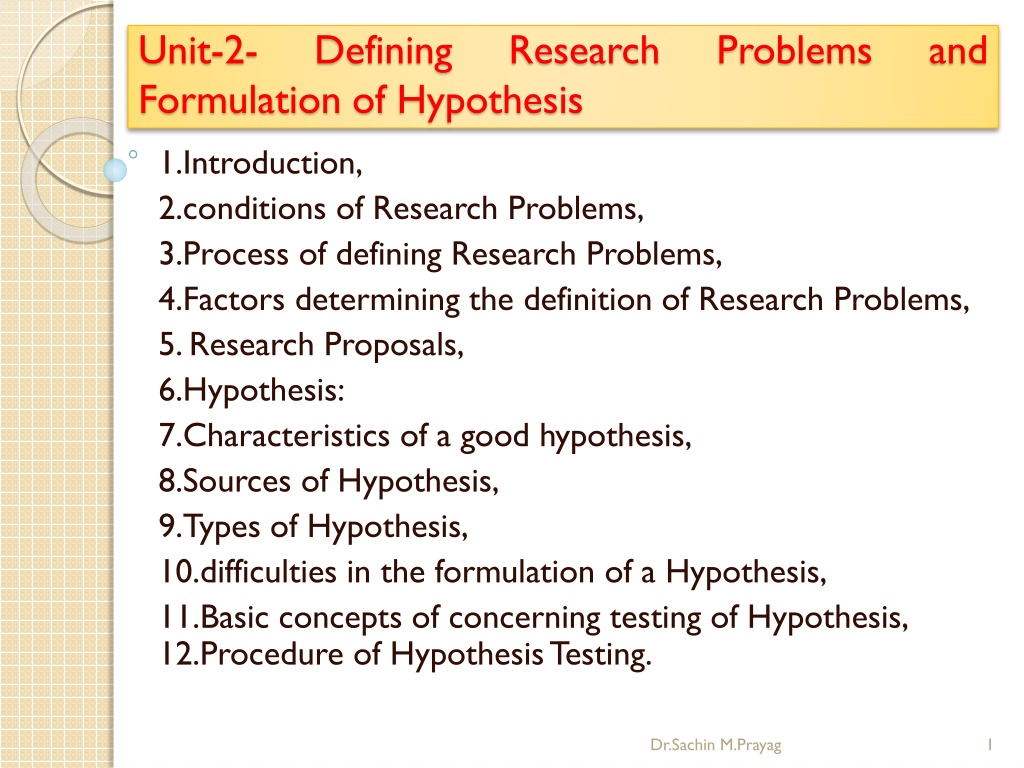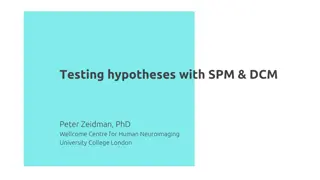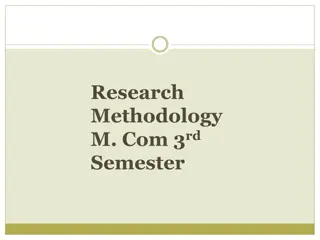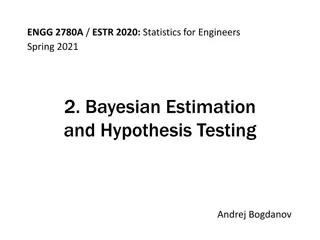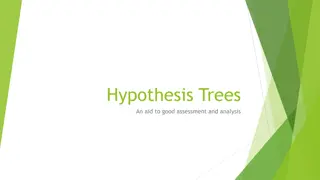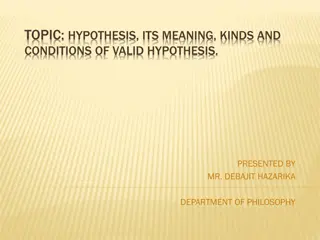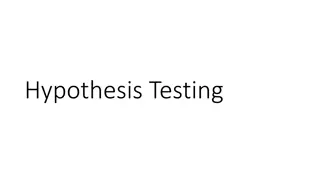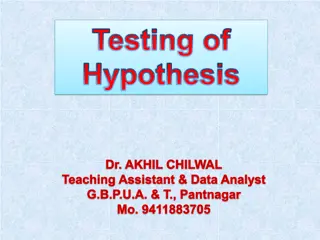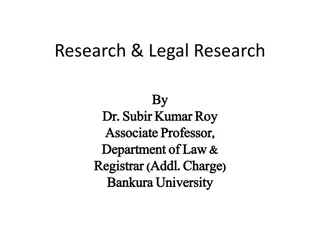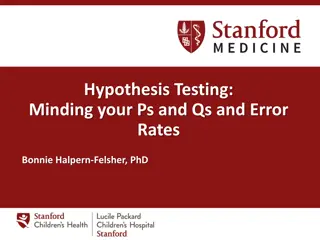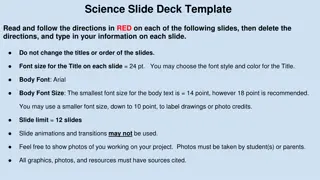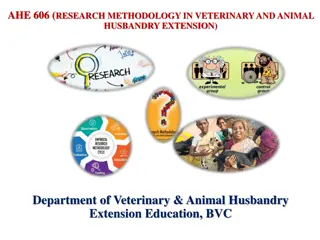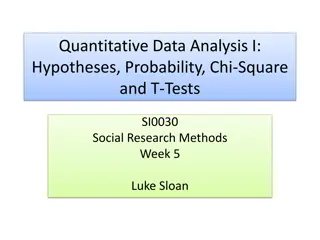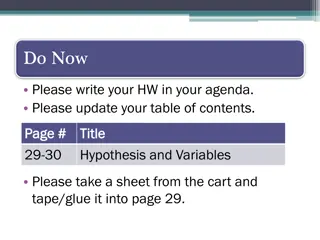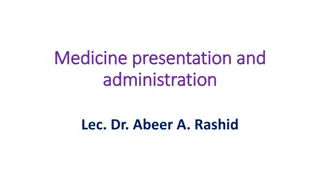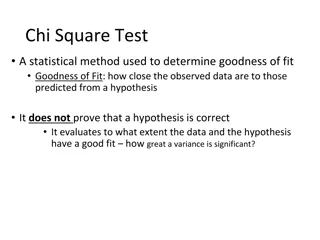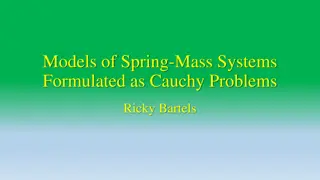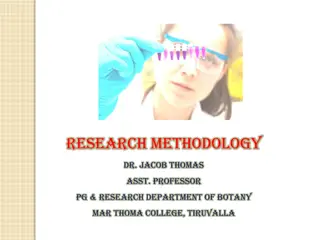Understanding the Formulation of Hypothesis and Research Problem Definition
Research problems arise from situations requiring solutions, faced by individuals, groups, organizations, or society. Researchers define research problems through questions or issues they aim to answer or solve. Various sources such as intuitions, research studies, brainstorming sessions, and consultations contribute to identifying research problems. Conditions like systematic subject involvement, literature study, and discussions with experienced individuals are crucial in formulating research problems.
- Formulation of Hypothesis
- Research Problems
- Sources of Research Problems
- Conditions of Research Problems
- Hypothesis Testing
Download Presentation

Please find below an Image/Link to download the presentation.
The content on the website is provided AS IS for your information and personal use only. It may not be sold, licensed, or shared on other websites without obtaining consent from the author. Download presentation by click this link. If you encounter any issues during the download, it is possible that the publisher has removed the file from their server.
E N D
Presentation Transcript
Unit-2- Formulation of Hypothesis Defining Research Problems and 1.Introduction, 2.conditions of Research Problems, 3.Process of defining Research Problems, 4.Factors determining the definition of Research Problems, 5. Research Proposals, 6.Hypothesis: 7.Characteristics of a good hypothesis, 8.Sources of Hypothesis, 9.Types of Hypothesis, 10.difficulties in the formulation of a Hypothesis, 11.Basic concepts of concerning testing of Hypothesis, 12.Procedure of Hypothesis Testing. Dr.Sachin M.Prayag 1
Introduction Research problem is some situation, difficulty or obstacle and there is need to find the solution for it. That difficulty may be faced by an individual,(Braille Script for blind) group or an organization.( Automobile sector introduced electrical car due to petrol crises) or society as whole(Corona Vaccine) Dr.Sachin M.Prayag 2
Introduction A Research problem is a question that a researcher wants to answer or a problem that a researcher wants to solve. A research problem is an issues or a concern that an investigator / researcher presents and justifies in a research study. Dr.Sachin M.Prayag 3
Sources of research Problem (with possible example of Research work) 1.Own intuitions (Braille Script) 2. Research Studies (Digital Library) 3.Brain storming sessions (ISO9000) 4.Inviting Suggestions (ATM) 5. Consultation ( Dr. Dixit Diet Plan) 6. Daily Experiences (Milk Cooker) 7. Filed Survey ( Fast-Tag for Toll tax) 8. Academic Discussion (Grade System/ Campus Interview) 9. Reading (Self Help Group) Dr.Sachin M.Prayag 4
Conditions of Research Problems Broadly there are three conditions which must be fulfilled in order to formulate important research problem. They are as follows 1] Systematic involvement in the subject matter 2] Study of relevant literature on the subject matter 3] Discussion with experienced person Dr.Sachin M.Prayag 5
Conditions of Research Problems 1] Systematic involvement in the subject matter:- Researcher should obtain first hand information and should deeply involved in the subject matter. He should visit the relevant area personally and try to collect relevant information directly. It helps him to frame relevant questions to be asked to the respondents. This work is known as pilot study or preliminary study or exploratory study. Dr.Sachin M.Prayag 6
Conditions of Research Problems 2] Study of relevant literature on the subject matter :- Researcher should come across with some problem or difficulty to decide his research problem. For this researcher have literature to know more about related theories, reports, records etc. This reading help him to know the research gap for further research. to read available Dr.Sachin M.Prayag 7
Conditions of Research Problems 3] Discussion with experienced person- Researcher has to discussed experience person like research supervisor (guide). Such discussion help him to get different aspects of the research work and guide him about the process in research. It help him to formulate research problem or hypothesis more effectively. Dr.Sachin M.Prayag 8
Process of defining Research Problems 1. Statement of Problem 2. Understanding the nature of problem (individual/ group/organization related) 3. Following the relevant literature survey 4. Discussion with experienced person 5.Rephrasing the research problem (Express the research problem in specific term like study, analysis, comparison and develop verifiable hypothesis) 6.Operational definition of the concepts (operational ways and basic assumptions must be clearly stated) 7. Delimiting the scope of study (keep the scope of his research within manageable limits to avoid confusion and ensure successful competitions of research work. Ex- Objective of the study , geographical and periodical scope of the research. Dr.Sachin M.Prayag 9
Factors determining the definition of Research Problems A researcher must know the factors that means elements of research problem to properly indentify the research problem. Prof. R. L. Ackoff have stated five components of research problem 1] Research consumer (beneficiary of research) 2] Research consumer s objective 3] Alternative means to meet the objectives 4]Doubt in regard to selection of Alternatives 5] There must be one or more environments Dr.Sachin M.Prayag 10
Factors determining the definition of Research Problems (1) Research Consumer: There must be individuals or groups which have some difficulty or problem. The individuals or the groups themselves may be researchers. There are other participants in the problem. (2) Research-Consumer s Objective: There must be some objectives to be attained as the research consumer must have something he wants to get it. It one wants nothing, one cannot have a problem. Dr.Sachin M.Prayag 11
Factors determining the definition of Research Problems (3) Alternative Means to Meet the Objective: There must be alternative means or the courses of action for attaining an objective one wishes to obtain. Means are courses of action. A course of action may involve the use of objects. Objects are the instruments. This means that there must be at least two means available to a researcher or if he has no choice or means, he cannot have a problem. Dr.Sachin M.Prayag 12
Factors determining the definition of Research Problems (4) Doubt in Regard to Selection of Alternatives: The existence of alternative courses of action is not enough. To experience a problem the researcher must have some doubt as to which alternative to select. Without such a doubt there can be no problem. This means that research must answer the question concerning the relative efficiency of the possible alternative. Dr.Sachin M.Prayag 13
Factors determining the definition of Research Problems (5) There must be one or More Environ- ments: There must be some environments to which the difficulty or problem pertains. A change in the environment may produce or remove a problem. A researcher may have doubts as to which will be the most efficient means in one environment but may entertain no such doubt in another. Some problems are quite general. Thus, a research problem is one which requires a researcher to find out the best solution for the given problem so that the objective can be attained optimally in the context of a given environment. Dr.Sachin M.Prayag 14
Research Proposal A research proposal is a simply a structured, formal document that explains what you plan to research (i.e. your research topic),why it s worth researching (i.e. your justification), and how you plan to investigate it (i.e. your practical approach). A good dissertation or thesis proposal needs to cover the what , the why and the how of the research. Let s look at each of these in a little more detail: Dr.Sachin M.Prayag 15
Contents of Good research Proposal 1. Title 2. Introduction 3. Literature Review 4. Aims and Objectives 5. Methodology 6. Scope of Research 7. Outline and Timetable Dr.Sachin M.Prayag 16
Hypothesis William Goode and Paul Hatt defines hypothesis as a preposition which can be put to a test to determine its validity G. A. Lundanberg defines hypothesis as, a tentative generalization the validity of which remains to be tested Dr.Sachin M.Prayag 17
7.Characteristics of a Good Hypothesis 1.Empirically Testable - 2. Concept Clarity- 3.Specific- 4.Related to available technique- 5. Theoretical relevance- 6. Consistency- 7. Objectivity- 8.Inclusive- Considered all other aspects of the problem Dr.Sachin M.Prayag 18
8.Sources of Hypothesis 1.Intuition 2.Research Studies 3.Consultation 4.Theory 5.Observation 6. Analogies 7. Culture 8.Continuty of Research Dr.Sachin M.Prayag 19
9.Types of Hypothesis On the basis of level of Abstraction 1. Common Senses Hypothesis 2. Complex Hypothesis 3. Analytical Hypothesis On the Basis of function Descriptive Hypothesis Relational Hypothesis Casual Hypothesis On the Basis of Nature of Hypothesis Working Hypothesis Null Hypothesis Statistical Hypothesis 1. 2. 3. 1. 2. 3. Dr.Sachin M.Prayag 20
Basic concepts of concerning testing of Hypothesis Hypothesis testing is a statistical technique that is used in a variety of situations. Though the technical details differ from situation to situation, all hypothesis tests use the same core set of terms and concepts. The following descriptions of common terms and concepts refer to a hypothesis test in which the means of two populations are being compared. Dr.Sachin M.Prayag 21
Basic concepts of concerning testing of Hypothesis 1. Null hypothesis 2. Alternative hypothesis 3. Significance 4. Power 5. Test statistic 6. Distribution of the test statistic 7. One-tailed vs. two-tailed tests 8. Critical value 9. Decision 10. P-value Source: - https://www.dummies.com/education/math/statistics/10-key- concepts-in-hypothesis-testing/ Dr.Sachin M.Prayag 22
Procedure of Hypothesis Testing Step 1: State the Null Hypothesis Step 2: State the Alternative Hypothesis Step 3: Set = probability of Type I Error Step 4: Collect Data Step 5: Calculate a test statistic Step 6: Construct Acceptance / Rejection regions Step 7: Based on steps 5 and 6, draw a conclusion about H0 Source- https://online.stat.psu.edu/stat502/lesson/1/1.2 1. 2. 3. 4. 5. 6. 7. Dr.Sachin M.Prayag 23
Reference Dr. Roshankumar M. Bhiganiya ,Research Methodology in Commerce and Management, Sharada Prakashan, Thane. 2.https://www.shareyouressays.com/knowledge/5-most-important- components-of-research-problem-as-discussed-by-r-l-ackoff/116017 3. https://gradcoach.com/what-is-a-research-proposal-dissertation- thesis/ 1. Dr.Sachin M.Prayag 24
